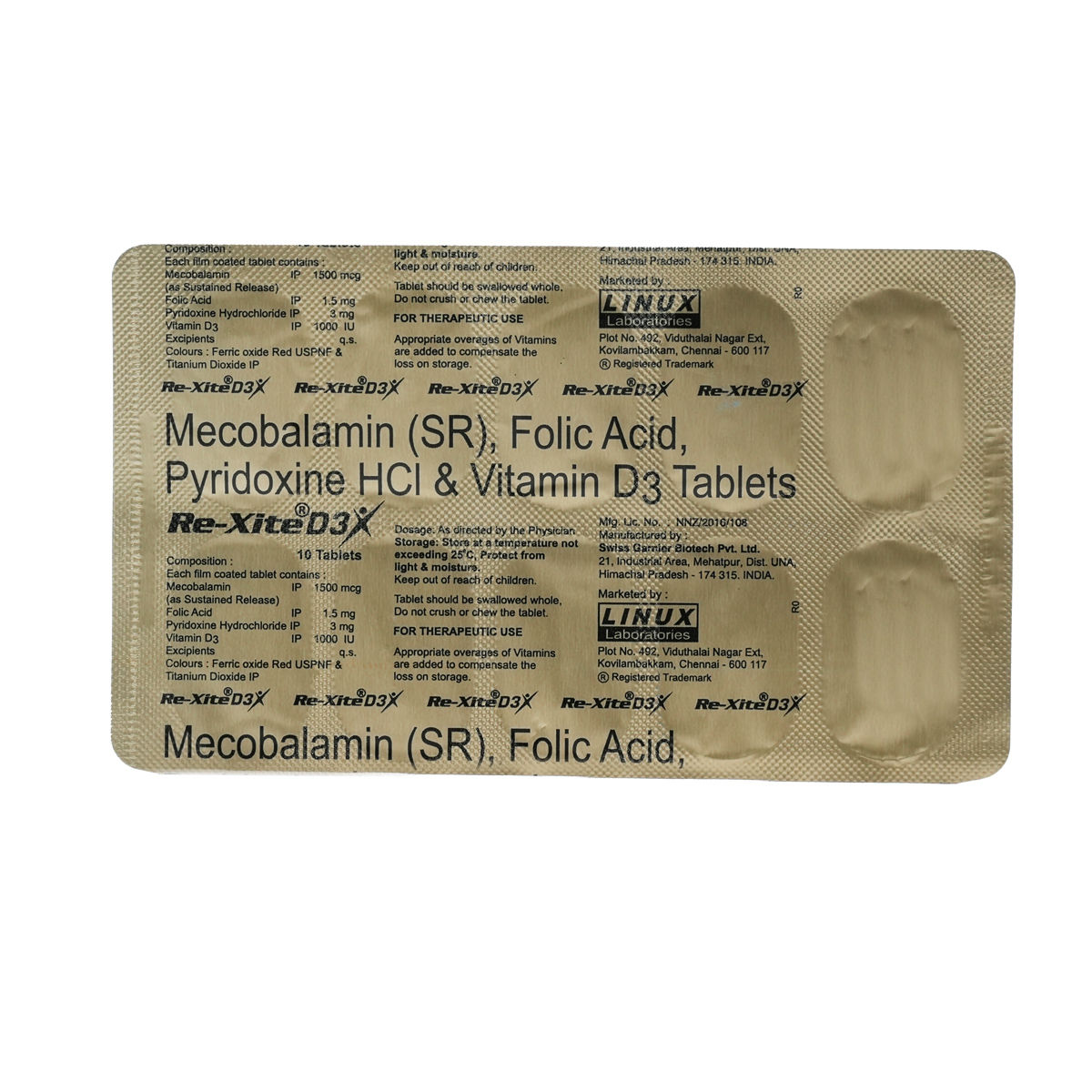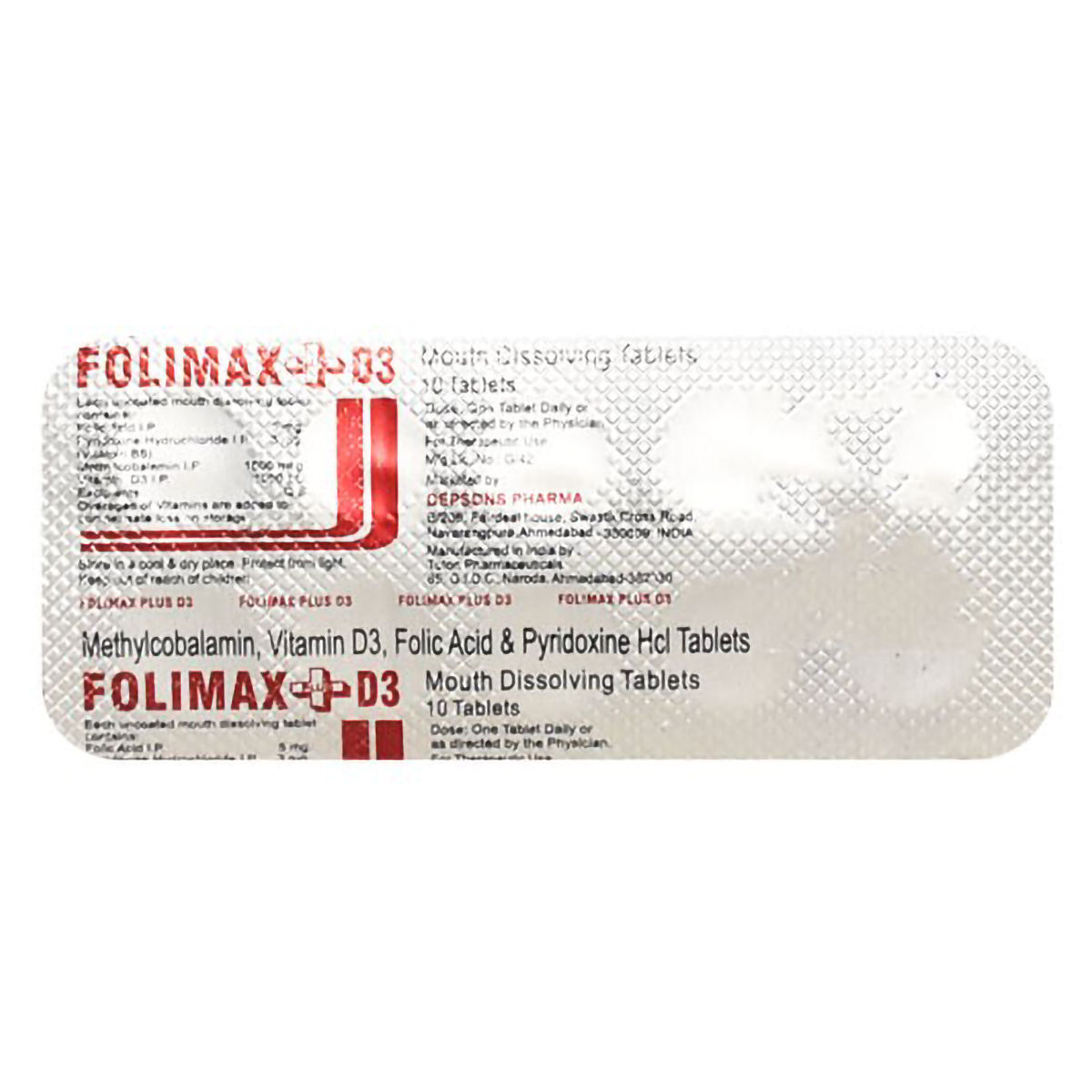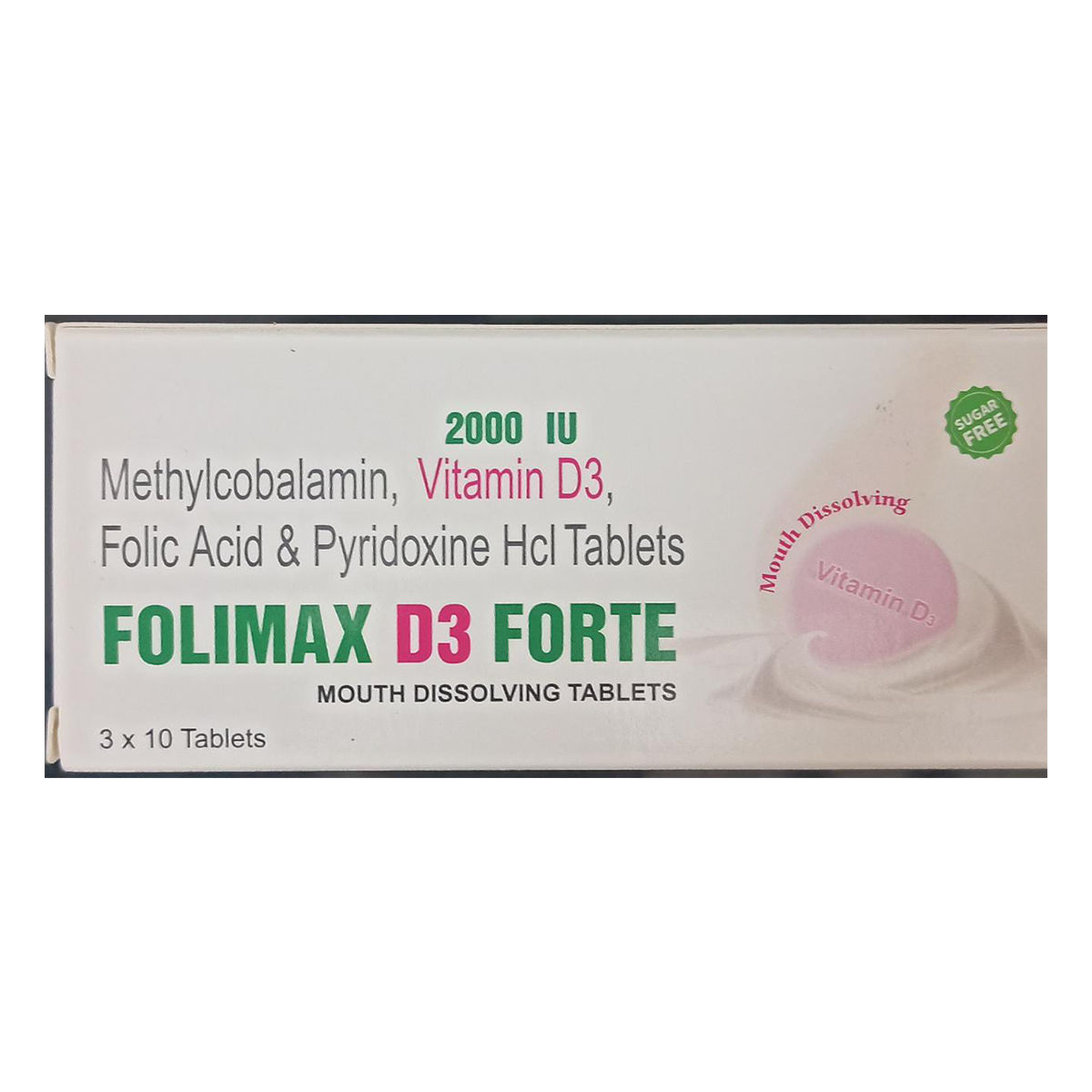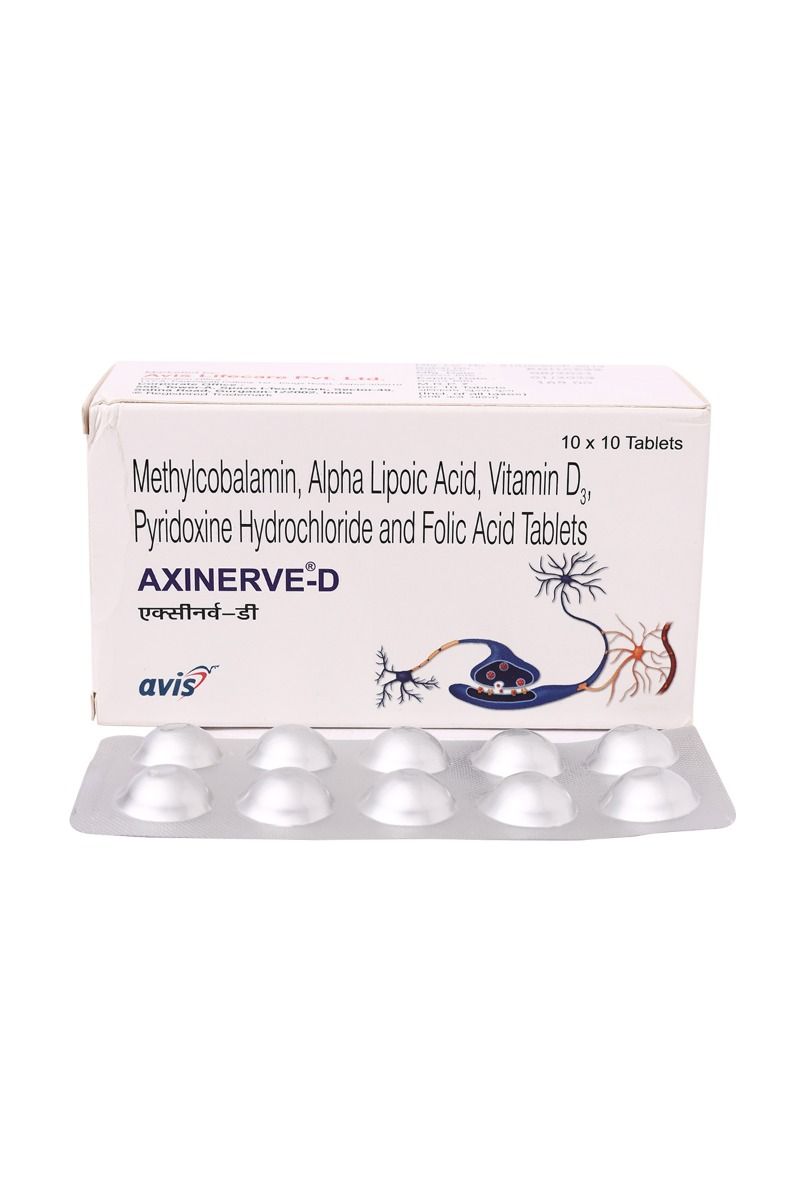METHYLCOBALAMIN+FOLIC ACID+PYRIDOXINE HYDROCHLORIDE+VITAMIN D3
About
METHYLCOBALAMIN+FOLIC ACID+PYRIDOXINE HYDROCHLORIDE+VITAMIN D3 belongs to the class of 'multivitamins', primarily used to treat nutritional deficiencies. It is used to treat and prevent low blood calcium levels, vitamin B6 deficiency, folate deficiency, and vitamin B12 deficiency. Nutritional deficiency occurs when the body is unable to absorb or get enough nutrients from food. It could lead to various health problems, including defective bone growth, skin disorders, digestive issues, and dementia (memory loss).
METHYLCOBALAMIN+FOLIC ACID+PYRIDOXINE HYDROCHLORIDE+VITAMIN D3 contains Vitamin D3, Folic acid, Pyridoxine hydrochloride, and Methylcobalamin. Vitamin D3/Cholecalciferol helps maintain blood calcium and phosphorus levels and mineralization of bone. Folic acid helps in the formation of red blood cells and prevents DNA changes that may lead to cancer. Pyridoxine hydrochloride is involved in protein, fat, and carbohydrate metabolism, the formation of red blood cells and neurotransmitters. Methylcobalamin/Vitamin B12/Mecobalamin regulates body functions, such as cell multiplication, blood formation, and protein synthesis.
Take METHYLCOBALAMIN+FOLIC ACID+PYRIDOXINE HYDROCHLORIDE+VITAMIN D3 as directed by your doctor. Sometimes, METHYLCOBALAMIN+FOLIC ACID+PYRIDOXINE HYDROCHLORIDE+VITAMIN D3 may cause common side effects like upset stomach, diarrhoea, drowsiness, flushing, and nausea. These side effects do not require medical attention and gradually resolve over time. However, if the side effects persist or worsen, consult a doctor.
Let your doctor know if you are using any other medicines before starting METHYLCOBALAMIN+FOLIC ACID+PYRIDOXINE HYDROCHLORIDE+VITAMIN D3. If you are known to be allergic to METHYLCOBALAMIN+FOLIC ACID+PYRIDOXINE HYDROCHLORIDE+VITAMIN D3 or its inactive components, please inform your doctor. Please tell your doctor if you have malabsorption syndrome (difficulty absorbing nutrition from food). If you are a pregnant or breastfeeding mother, please consult your doctor before taking METHYLCOBALAMIN+FOLIC ACID+PYRIDOXINE HYDROCHLORIDE+VITAMIN D3.
Uses of METHYLCOBALAMIN+FOLIC ACID+PYRIDOXINE HYDROCHLORIDE+VITAMIN D3
Medicinal Benefits
METHYLCOBALAMIN+FOLIC ACID+PYRIDOXINE HYDROCHLORIDE+VITAMIN D3 is used to treat nutritional deficiencies and contains Vitamin D3, Folic acid, Pyridoxine hydrochloride, and Methylcobalamin. Vitamin D3 helps maintain blood calcium and phosphorus levels and mineralization of bone. It is used to treat and prevent bone disorders, such as rickets and osteomalacia. Folic acid helps in the formation of red blood cells and prevents DNA changes that may lead to cancer. It prevents and treats folate deficiency (low blood levels of folate) and hyperhomocysteinemia (high blood levels of amino acid, homocysteine). Pyridoxine hydrochloride (vitamin B6) treats and prevents vitamin B6 deficiency, anaemia (lack of red blood cells), peripheral neuropathy (nerve disorder), and seizures (fits). It is involved in protein, fat, and carbohydrate metabolism and the formation of red blood cells and neurotransmitters. Methylcobalamin regulates body functions, such as cell multiplication, blood formation, and protein synthesis. It is used to treat alcoholic neuropathy, pernicious anaemia (red blood cells are not produced due to Vitamin B12 deficiency), diabetic neuropathy (nerve damage due to high blood sugar levels), and multiple sclerosis (immune system disease affecting the brain).
Directions for Use
Storage
Side Effects of METHYLCOBALAMIN+FOLIC ACID+PYRIDOXINE HYDROCHLORIDE+VITAMIN D3
- Upset stomach
- Diarrhoea
- Drowsiness
- Flushing
- Nausea
In-Depth Precautions and Warning
Drug Warnings
Brief your medical history to your doctor if you have any heart/kidney/liver diseases or kidney stones before starting METHYLCOBALAMIN+FOLIC ACID+PYRIDOXINE HYDROCHLORIDE+VITAMIN D3. Inform your doctor if you have malabsorption syndrome. Pregnant or breastfeeding women should consult their doctor before taking METHYLCOBALAMIN+FOLIC ACID+PYRIDOXINE HYDROCHLORIDE+VITAMIN D3. Excessive alcohol consumption reduces the absorption and increases the elimination of folic acid. Alcohol can also worsen the side effects like drowsiness and stomach upset. Hence, please avoid alcohol while using METHYLCOBALAMIN+FOLIC ACID+PYRIDOXINE HYDROCHLORIDE+VITAMIN D3.
Drug Interactions
Drug-Drug Interaction: METHYLCOBALAMIN+FOLIC ACID+PYRIDOXINE HYDROCHLORIDE+VITAMIN D3 may interact with anti-cancer drugs (altretamine, cisplatin), fits medicines (phenytoin, phenobarbital), antibiotics (chloramphenicol), medicines treating Parkinson's disease (levodopa), drugs used to treat tumours (Fluorouracil), antibiotics (trimethoprim), stomach related drugs (sulfasalazine), and cholesterol-lowering drugs (cholestyramine).
Drug-Food Interaction: Excessive alcohol consumption reduces the absorption and increases the elimination of folic acid. Hence, please avoid alcohol intake while using METHYLCOBALAMIN+FOLIC ACID+PYRIDOXINE HYDROCHLORIDE+VITAMIN D3.
Drug-Disease Interaction: Use METHYLCOBALAMIN+FOLIC ACID+PYRIDOXINE HYDROCHLORIDE+VITAMIN D3 with medical advice if you have malabsorption syndrome, hypercalcaemia (excess calcium levels), hypervitaminosis D (high vitamin D levels), Vitamin D toxicity, heart/kidney/liver/blood vessel diseases, and kidney stones.
Drug-Drug Interactions Checker List:
Safety Advice

Alcohol
cautionExcessive alcohol consumption reduces the absorption and increases the elimination of folic acid. Hence, please avoid alcohol while using METHYLCOBALAMIN+FOLIC ACID+PYRIDOXINE HYDROCHLORIDE+VITAMIN D3.

Pregnancy
cautionMETHYLCOBALAMIN+FOLIC ACID+PYRIDOXINE HYDROCHLORIDE+VITAMIN D3 should be used during pregnancy only when recommended by your doctor. Let your doctor know if you are pregnant or planning to conceive before taking METHYLCOBALAMIN+FOLIC ACID+PYRIDOXINE HYDROCHLORIDE+VITAMIN D3.

Breast Feeding
cautionPyridoxine and Folic acid, in METHYLCOBALAMIN+FOLIC ACID+PYRIDOXINE HYDROCHLORIDE+VITAMIN D3, are excreted into the breast milk. Please consult your doctor before taking METHYLCOBALAMIN+FOLIC ACID+PYRIDOXINE HYDROCHLORIDE+VITAMIN D3 if you are a breastfeeding mother.

Driving
not applicableMETHYLCOBALAMIN+FOLIC ACID+PYRIDOXINE HYDROCHLORIDE+VITAMIN D3 usually does not interfere with your driving ability. Please consult your doctor if you experience any unwanted side effects.

Liver
cautionLet your doctor know if you have any history of liver diseases before taking METHYLCOBALAMIN+FOLIC ACID+PYRIDOXINE HYDROCHLORIDE+VITAMIN D3. Hepatic impairment/liver disease can alter the metabolic and therapeutic activity of certain Vitamin D forms.

Kidney
cautionIt is advised to seek a doctor's advice before starting METHYLCOBALAMIN+FOLIC ACID+PYRIDOXINE HYDROCHLORIDE+VITAMIN D3 if you have kidney diseases like kidney stones or undergoing dialysis.

Children
consult your doctorPlease consult your doctor. The dose of METHYLCOBALAMIN+FOLIC ACID+PYRIDOXINE HYDROCHLORIDE+VITAMIN D3 is based on your child's age and bodyweight.
Habit Forming
Diet & Lifestyle Advise
- Try Vitamin B complex food sources like milk, cheese, eggs, liver and kidney, chicken, red meat, tuna, mackerel, salmon, shellfish, oysters, clams, dark green vegetables such as spinach and kale, beets, avocados, potatoes, whole grains, cereals, kidney beans, black beans, and chickpea.
- Try folate-rich food sources like broccoli, Brussels sprouts, leafy green vegetables, cabbage, kale, spring greens, spinach, peas, chickpeas, kidney beans, and breakfast cereals fortified with folic acid.
- Include the best dietary sources of vitamin D, such as fish liver oils and vitamin D–fortified milk.
- Include dairy products like milk, yoghurt, cheese, or milk-based custard in your diet.
- Sprinkle sesame and sunflower seeds over your food, vegetables, and salads.
- Include fruits like citrus, banana, and watermelon in your diet.
- Avoid smoking and alcohol consumption.
- Exercise regularly and maintain a healthy lifestyle. Avoid excess fatty foods.
Special Advise
- Clinical monitoring of folic acid, vitamins D, B12, and B6 levels through blood examinations are recommended.
- Let your doctor and the laboratory staff know if you are using METHYLCOBALAMIN+FOLIC ACID+PYRIDOXINE HYDROCHLORIDE+VITAMIN D3 since Pyridoxine hydrochloride may interfere with laboratory tests like urine tests for urobilinogen.
Patients Concern
Disease/Condition Glossary
Nutritional deficiencies: It occurs when the body does not absorb or get enough nutrients from food. Many nutrients are essential for a healthy life. Sometimes your body is unable to absorb many nutrients even if you are consuming them. Nutrient deficiency can lead to many health problems like the weakened immune system, indigestion, skin problems, heart problem, eye problems and defective bone growth. Nutritional deficiency symptoms include pale skin, fatigue, weakness, trouble breathing, feeling faint, and poor concentration.
FAQs
METHYLCOBALAMIN+FOLIC ACID+PYRIDOXINE HYDROCHLORIDE+VITAMIN D3 is a dietary supplement and consists of Vitamin D3, Folic acid, Pyridoxine hydrochloride (vitamin B6) and Methylcobalamin (vitamin B12). When you lack these vitamins in your body, which cannot be recovered even with the food sources, METHYLCOBALAMIN+FOLIC ACID+PYRIDOXINE HYDROCHLORIDE+VITAMIN D3 helps in normalising these deficient levels. Collectively, METHYLCOBALAMIN+FOLIC ACID+PYRIDOXINE HYDROCHLORIDE+VITAMIN D3 treats nutritional deficiencies.
Vitamin B6 deficiency occurs when your body lacks adequate Pyridoxine levels. You can overcome this deficiency by including food sources rich in Pyridoxine like milk, eggs, beef, pork, chicken or turkey, fish, peanuts, soya beans, wheat germ, oats, and bananas. If your Vitamin B6 levels are still low, your doctor may advise its supplements.
Folate deficiency occurs when your body lacks adequate folic acid/folate levels. You can overcome this deficiency by including food sources rich in folic acid like broccoli, brussels sprouts, leafy green vegetables, cabbage, kale, spring greens, spinach, peas, chickpeas, kidney beans, and breakfast cereals fortified with folic acid. If your folic acid levels are still low, your doctor may suggest its supplements.
Pyridoxine hydrochloride in METHYLCOBALAMIN+FOLIC ACID+PYRIDOXINE HYDROCHLORIDE+VITAMIN D3 may interfere with laboratory tests like urine tests for urobilinogen. Please make sure your doctor and the laboratory staff know that you take METHYLCOBALAMIN+FOLIC ACID+PYRIDOXINE HYDROCHLORIDE+VITAMIN D3 before undergoing any blood and urine examinations.
Antacids may interfere with the absorption of METHYLCOBALAMIN+FOLIC ACID+PYRIDOXINE HYDROCHLORIDE+VITAMIN D3. Hence it is advised to take METHYLCOBALAMIN+FOLIC ACID+PYRIDOXINE HYDROCHLORIDE+VITAMIN D3 two hours before or four hours after taking antacids.
Available Medicines for
METHYLCOBALAMIN+FOLIC ACID+PYRIDOXINE HYDROCHLORIDE+VITAMIN D3





